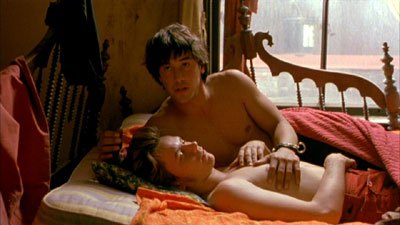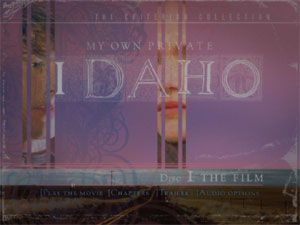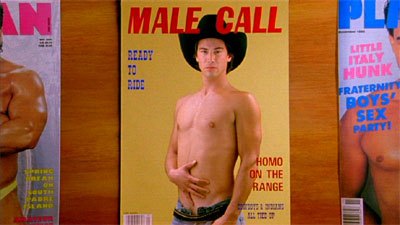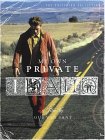| Reviews & Columns |
|
Reviews DVD TV on DVD Blu-ray 4K UHD International DVDs In Theaters Reviews by Studio Video Games Features Collector Series DVDs Easter Egg Database Interviews DVD Talk Radio Feature Articles Columns Anime Talk DVD Savant Horror DVDs The M.O.D. Squad Art House HD Talk Silent DVD
|
DVD Talk Forum |
|
|
| Resources |
|
DVD Price Search Customer Service #'s RCE Info Links |
|
Columns
|
|
|
My Own Private Idaho - Criterion Collection
Criterion releases a beautiful blend of Van Sant and Shakespeare

The Movie
My Own Private Idaho is, at its core, a dramatic romance; a film about what happens when one loves, but is not loved in return. That's a fine type of film to make, but there's so much more at work in Gus Van Sant's neo-classic mix of street hustling and Shakespeare. From the artistic experimentation of pulling dialogue and plot from the Bard and mixing it with a faux-documentary feel to drag the viewer deep into a world they would never choose to visit, to the creative choices made with the camera, MOPI hums with the energy of independent film.
The main story centers around Mike (River Phoenix), a narcoleptic male prostitute looking to find the mother he lost as a child and the love he's been searching for. Whenever stress gets to be too much for him, he blacks out, and often finds himself in another part of the country. That's often thanks to Scott Favor (Keanu Reeves), the son of a rich man, who's also sleeping with men for money, but not because he is gay. No, he's just interested in lowering people's expectations of himself, so that he can make a Phoenix-like rise when he is ready to do so. He's also the apple of Mike's eye, whether he wants to be or not. That he truly does not is Mike's biggest problem.
A subplot involving Bob Pigeon (director William Reichert), a Falstaff-ian underground father-figure for Scott, does well to allow Mike and Scott the opportunity to explore the subculture of street hustling, but for the most part, he mainly helps solidify the Shakespearean underpinnings of the film. Years before Baz Luhrmann would marry the Bard to modern film sensibilities in his take on "Romeo and Juliet," Van Sant was melding the two, using the stylized language of The Globe Theatre to make a hyper-reality for his characters, a world where anything could happen, reducing the audience's need to believe, so they could instead just accept and enjoy.
Though his career was too short, this performance established Phoenix as a true star, an actor capable of just about anything. His emotive face could be both hard and pathetically vulnerable, and the quiet scene he shares with Reeves around the campfire is one of the most heartwrenching moments in film. Reeves is good in his part, delivering the bulk of the awkward Shakespearean dialogue, in much the same way he bulled his way through the Bard in Much Ado About Nothing. Watching his confident performance as the gay-for-pay Favor makes it obvious why he became the star he is today. Even when his delivery is stilted, he can still express emotion. It's a superficial skill, but he makes it work.
While Phoenix and Reeves would get their raves for MOPI, the star of the show is Van Sant. Coming off his career-making work on Drugstore Cowboy, he could have gotten away with just about anything, and so he pushed the envelope. Sex scenes shot as series of living stills, Shakespearean language substituted for modern English, time-lapse photography... Van Sant was able to make them work because they weren't his focus. They were simply better ways for him to use to tell his story. Had he resorted to these techniques as gimmicks, he might still be directing music videos. Instead, he's one of America's preeminent artistic directors. As important as Mala Noche and Drugstore Cowboy were, this film is where he truly made his mark.

The DVDs
Criterion has put together an excellent two-disc presentation for My Own Private Idaho, starting with the packaging, which is a matte-finished cardboard slipcase with a weathered book design. With an opening to the left, the slipcase holds a four-paneled digipak and a booklet (see The Extras). The digipak continues the design concept, with more elegant art, DVD instructions and chapter stops.
For some odd reason, the DVDs feature animated full-frame menus, instead of anamorphic widescreen. Though not anamorphic, they look great on a widescreen monitor. The film and trailer are on the first disc, while the extras are mainly on the second DVD. Disc One features options to play the film, choose chapters, view the trailer or select audio options, which include English 2.0 and 5.l. Instead of still or animated previews, the scene selection menus have just chapter titles available. Using the remote, English subtitles are available, along with closed captioning. Disc Two presents the six options on the first animated menu.
 The Quality
The Quality
Van Sant approved this new digital transfer, so you'd expect it to look good. Those expectations are met, as the anamorphic widescreen video is crisp and clean, with almost all of the evident dirt and damage cleaned up methodically to create a beautiful image. Detail is excellent and there's not much in the way of obvious grain. Skin tones seem a bit red, but it could just be a the film's palette, which is very red. Brighter reds could have shimmered and bled, but even that is under control. This disc looks better than MOPI has probably ever looked on any format. The time-lapse photography alone is worth a view.
The audio is available in the original 2.0 Stereo as well as Dolby 5.1, the surround sound being a newly-produced track made from the original film. The 2.0 sometimes has stronger dialogue, as the surround track can seem a bit thin at times. The surround speakers get a bit of action from the 5.1, including some ambient sound and music that helps make the sound field deeper. Despite the new track, the center channel seems to be doing most of the work though. What is there sounds good, without any distortion. The dialogue is well defined, and the surround effects are well mixed, so as to not overpower. A solid job.
The Extras
Criterion has packed the majority of the extras on a second disc, putting only the film's curious trailer on the first DVD. Following the title card concept of the movie, the trailer does a good job of introducing the film, without giving away much. It doesn't look great though, as it's loaded with dirt, damage and scratches.
Instead of doing an audio commentary, Van Sant sat down with fellow director Todd Haynes (Far from Heaven) for an audio conversation about the film. The track plays over a set of three menu screens, with 33 sections in all, and is a bit annoying in terms of usability, as, at least on my player, you can't pause a static menu, so you can't pause the conversation. (Someone out there might have a solution for this.)
Apparently there was a TV playing the movie in the room, but the conversation needed more time than the film's length allowed, so the track is edited to get rid of dead air. It still runs well past the film's end, but it gets to the point quickly. The flow isn't exactly smooth, as the conversation has a definite "question followed by answer, then stop" pace. Worse still is Haynes' love for Van Sant. Haynes' fawning is nearly James Lipton-like, as he "yeahs" and "wows" his way through. Covering topics like financing, editing, and behind-the-scenes shenanigans as well as directing and writing philosophy and theory, the track is far from boring or unnecessary, but a critic might have challenged Van Sant a bit more.
The anamorphic widescreen featurette "The Making of My Own Private Idaho" covers some of the topics talked about by Van Sant in his conversation with Haynes, but without any of the main players. Instead, Van Sant's crew gets to share their thoughts and memories of the film's production. Editor Curtiss Clayton, DPs John Campbell and Eric Alan Edwards and production design David Brisbian spend a little over 42 minutes reminiscing and sharing stories from behind the camera. Getting a different perspective on how a movie is made is always welcome, and this is a unique (ad well-produced) extra because of it. An index screen allows you to watch any of the seven sections separately or all at once.
The 44-minute "Kings of the Road," also in anamorphic widescreen, features film scholar Paul Arthur, and focuses on MOPI's place in the overall spectrum of film, the genres it touches on, influences that touched it and Van Sant's career in general. Road movies, male identity and Shakespeare are discussed among the elements that make up the spine of the movie, and the history behind those genres. It also looks at MOPI in terms of Van Sant's career and what it says about his filmmaking and himself personally. Designed to mimic the title cards from the film, it's a well-done academic dissection of Van Sant's work. An index screen breaks the featurette down into 11 parts that can be viewed separately or at one time.
Producer Laurie Parker and River Phoenix' younger sister Rain sat down for a video chat for the DVD, talking for a little over 19 minutes about River and the movie. Face to face, Parker does most of the talking, as she has the most to say after working on the film. Rain, who was 18 at the time of the film's production, mostly just reacts, though occasionally she kicks in a thought in a more general vein, or a memory of River or working with Van Sant on Even Cowgirls Get the Blues. This one's not as interesting as the other featurettes, but River fans should enjoy the idolizing.
A final conversation, between a pair of ex-street kids and current writers, JT LeRoy and Jonathan Caouette, wraps up the new bonus materials. The two Van Sant collaborators chat for over 53 minutes, broken up into 16 optional chapters, about My Own Private Idaho, how it relates to their experiences in life and on the street and other tangential subjects. They conference in Van Sant to ask him questions about the film and to help them remember, which is a good thing, because LeRoy is the audio equivalent to sleeping pills. His feminine voice mumbles and flows like molasses, coming in at about half the volume of Caouette's. Several times I found myself blacking out and wondering what I missed. Connecting the film to the world it depicts is a worthy concept, but the execution falls a bit short here, in an audio track that's akin to a late-night bull session with your drug-addled friends.
Six deleted scenes were also included, in anamorphic widescreen. The quality of these scenes is sketchy, but not horrendous. There are several white-outs for edits and plenty of dirt, but these aren't exactly archived prints. The scenes are, for the most part, extensions of scenes in the movie, though two show excised plot points that are discussed in the conversation tracks. It's hard to say they'd be any good in the finished product, but they don't stick out like sore thumbs either. Also included with the deleted scenes is the footage of the barn with the scratch that Van Sant talks about with Haynes. It's nice to see this illustrated, instead of having to imagine it.
Besides the extras on the DVDs, Criterion has included a beautiful 64-page booklet with photos, stills, art, essays by The Village Voice's Amy Taubin and author JT LeRoy, and interviews with Van Sant, Reeves and Phoenix from Interview magazine. The quality of this publication is fantastic, and makes the perfect addition to this DVD set. An interview of Van Sant, conducted by Phoenix, gives excellent insight into both men.

The Bottom Line
A heart-breaking tale of unrequited love. A gay romp around the world. A big-time film-school experiment. My Own Private Idaho is a bit of all these things, with some Shakespeare sprinkled on top, and Van Sant's ear and eye for art thrown in for good measure. It's also one of the best films to feature young actors and one of the best performances ever turned in by the late River Phoenix. Criterion has created what is likely the best version of this film that will ever be made. From the extensive extras, which take an in-depth look at the film from just about every angle, to the classy packaging to the excellent book, MOPI is one of the most film-appropriate DVD sets ever produced about a single film. While the subject matter of gay male prostitution and Shakespeare isn't everyone's cup of tea, get over it. This is a film about flawed humans and most anyone should be able to find a connection to this creative effort and the incredible effort of the DVD producers.
Francis Rizzo III is a native Long Islander, where he works in academia. In his spare time, he enjoys watching hockey, writing and spending time with his wife, daughter and puppy.Follow him on Twitter
*The Reviewer's Bias section is an attempt to help readers use the review to its best effect. By knowing where the reviewer's biases lie on the film's subject matter, one can read the review with the right mindset.
|
| Popular Reviews |
| Sponsored Links |
|
|
| Sponsored Links |
|
|
| Release List | Reviews | Shop | Newsletter | Forum | DVD Giveaways | Blu-Ray | Advertise |
|
Copyright 2024 DVDTalk.com All Rights Reserved. Legal Info, Privacy Policy, Terms of Use,
Manage Preferences,
Your Privacy Choices | |||||||














